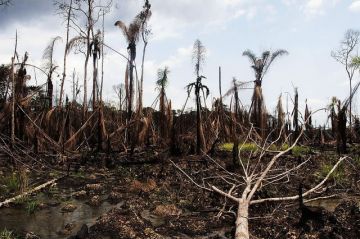The gaps between stakeholders embroiled in the ongoing debate over the curse of oil in Nigeria crystallized again when The Guardian turned the spotlight in a recent article on a UN Environment Programme (UNEP) study assessing the environmental impact of oil spills in Ogoniland in the Niger Delta.
My former employer, Shell, was pumping oil until about 15 years ago in Ogoni. The company faces a number of environmental and social problems in the Niger Delta – where the joint venture in which it is a partner, SPDC, is an active oil producer.
The core of the present controversy is whether – as the Nigerian government says, using oil industry data – most of the pollution in Oginiland is the result of illegal bunkering, oil theft done by hacking holes in pipelines and siphoning off crude, which is transferred to barges in the delta and later to ships off shore. Or, as local political leaders and most NGOs concluded, Shell is to blame and anyone who doesn’t blame Shell is simply wrong.
When the issue heated up again a couple of weeks ago, it was seemingly because of a misunderstanding. It was initially reported that data quoted by a UNEP official (90 percent of spills in Ogoni are due to bunkering) was the outcome of the UNEP review, which won’t be ready until 2011.
Those who found that conclusion unacceptable immediately poured scorn on UNEP – and quickly tried to undermine the UN agency’s credibility. Because Shell is funding the study (and so doing because the Nigerian government wouldn’t), its conclusions must be skewed, the critics said.
In hindsight, it might have been politically more expedient if the environmental impact assessment hadn’t been funded by Shell. Easier for UNEP, easier for Shell.
But this is a total side issue. Here’s why. In the circumstances, after the Nigerian government asked UNEP to step in but refused to pay for the review, it became clear that someone needed to step in to proceed with UNEP in order to get an independent, authoritative assessment.
Shell, a company I know fairly well after five years as the global head of communications and stakeholder relations, decided to do so because it is trying to find ways out of its multiple Nigeria quandaries. It is addressing its issues, slowly but surely. Settling the situation in Ogoniland is a priority. For all this, it needs data, as do the Nigerian authorities.
To get actionable data, companies often contract experts to conduct external assessments of problems or performance aspects. The auditors, the consultants and the law firms that conduct such assessments act on the principle that their credibility and sustained business success depend wholly on their independence, integrity, professional care and objectivity.
The last thing a decent company wants – and Shell, in my view, is a decent company – is a review that glosses over issues. Especially in a case of such importance as the situation in which Shell finds itself in the Niger Delta, where for good reasons it is at the focus of much scrutiny.
For me, moreover, to think that UNEP would let itself be swayed by who pays for its environmental assessment work is simply not realistic. This would forever erode a UN agency’s ability to intervene.
UNEP has about 100 people on the ground in Ogoniland working on the assessment. This team, local employees, professionals from other parts of Nigeria, and UNEP officials, is led by UN post-conflict experts with experience accumulated from the Balkan wars in the early 1990s onwards. They know their stuff.
Just as it is unrealistic, cynical and frankly naïve to believe that Shell would seek a skewed UN report, it is unimaginable that UNEP would agree to falsify data.
So, let’s not rush to judgment. Let’s wait for the report in 2011.
And let’s think about the role this UNEP report can play to stimulate the sort of action that would really improve life in the Niger Delta and overcome the trust deficit there.
Photo: Flickr/Sosialistisk Ungdom (SU)





























How should businesses respond to an age of conflict and uncertainty?
As 2024 began, European Commission President Ursula von der Leyen aptly summed up our deeply worrying collective moment. As she put it, speaking at the annual World Economic Forum in Switzerland, we are moving through “an era of conflict and...
26 March 2024 | Commentary
Commentary by Scott Jerbi, Senior Advisor, Policy & Outreach, IHRB